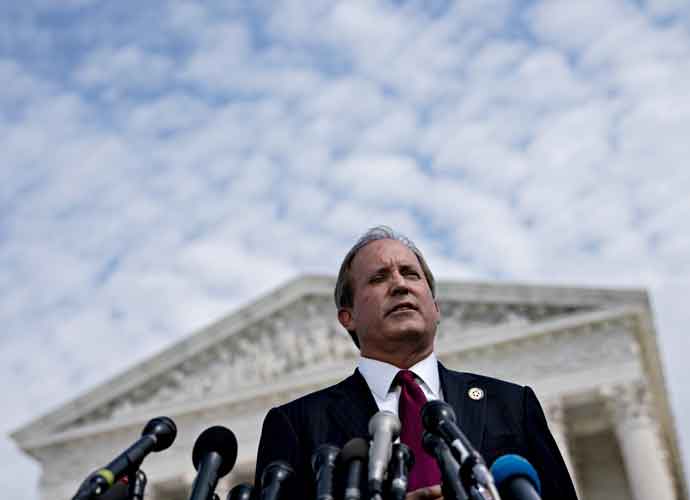

Ken Paxton, Texas attorney general, speaks during a news conference outside the Supreme Court in Washington, D.C., U.S., on Monday, Sept. 9, 2019. A group of 50 attorneys general opened a broad investigation into whether advertising practices of Alphabet Inc.'s Google violate antitrust laws. Photographer: Andrew Harrer/Bloomberg via Getty Images
The U.S. Supreme Court ruled to make it more difficult to convict someone of making a violent threat. The 7-2 decision will now serve as a precedent for similar cases.
The justices ruled in favor of Billy Counterman, who contacted musician Coles Whalen on Facebook in 2010 and resumed communications with her four years later. He sent her hundreds of concerning messages, to which she did not respond and ended up blocking him. However, Counterman continued to make new accounts and text her.
Counterman’s notes became delusional and dark, as he began threatening and insinuating that he was stalking her. The messages were reported to law enforcement and Counterman was arrested and convicted, sentenced to more than four years in prison.
This week, the case was re-opened, as Counterman’s lawyer has argued that he suffers from mental illness and was not aware that the messages he was sending could be perceived as dangerous.
Subscribe to our free weekly newsletter!
A week of political news in your in-box.
We find the news you need to know, so you don't have to.
The Supreme Court ruled that, in cases pursuant to online threats and harassment, prosecutors must show that “the defendant had some subjective understanding of the threatening nature of his statements.”
Counterman’s case will now be reviewed again by lower courts.
The decision comes in the midst of warnings from President Joe Biden and his administration, who have acknowledged the effects that social media has had on harassment and stalking. Specifically, the administration fears for the safety of public officials, who have been receiving an increasing amount of threats over the years.
Biden has generally agreed with the dissenting opinion which claims that, in cases of harassment and intimidation, prosecutors simply have to prove that a reasonable person would see the defendant’s actions as threatening.
Colorado Attorney General Phil Weiser, whose office prosecuted Counterman, said in a statement that he fears the decision will make it “more difficult to stop stalkers from tormenting their victims.”
Counterman’s lawyer, John Elwood, thanked the Supreme Court for siding with Counterman.
In a statement, Elwood said that they are “gratified that the Supreme Court agreed with Billy Counterman that the First Amendment requires proof of mental state before it can imprison a person for statements that are perceived as threatening.”
British Prime Minister Keir Starmer announced Tuesday that the United Kingdom will recognize Palestine as…
Former North Carolina Gov. Roy Cooper (D) announced he will run for North Carolina’s open…
President Donald Trump is losing support from independent voters, fueled by disappointment with the handling…
Rep. Marjorie Taylor Greene (R-Georgia) dubbed the humanitarian conflict in Gaza a “genocide” in a…
Rep. Thomas Massie (R-Kentucky) and Rep. Ro Khanna (D-California) are leading a bipartisan push to…
The Trump Administration is working with tech company Palantir to collect all unclassified information about…